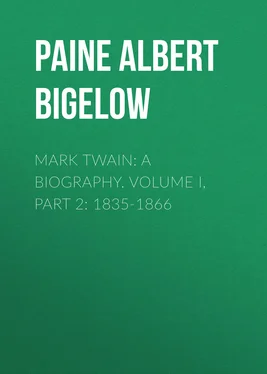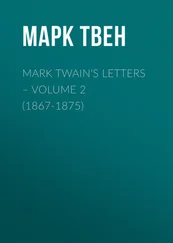Albert Paine - Mark Twain - A Biography. Volume I, Part 2 - 1835-1866
Здесь есть возможность читать онлайн «Albert Paine - Mark Twain - A Biography. Volume I, Part 2 - 1835-1866» — ознакомительный отрывок электронной книги совершенно бесплатно, а после прочтения отрывка купить полную версию. В некоторых случаях можно слушать аудио, скачать через торрент в формате fb2 и присутствует краткое содержание. Жанр: Биографии и Мемуары, foreign_antique, на английском языке. Описание произведения, (предисловие) а так же отзывы посетителей доступны на портале библиотеки ЛибКат.
- Название:Mark Twain: A Biography. Volume I, Part 2: 1835-1866
- Автор:
- Жанр:
- Год:неизвестен
- ISBN:нет данных
- Рейтинг книги:5 / 5. Голосов: 1
-
Избранное:Добавить в избранное
- Отзывы:
-
Ваша оценка:
- 100
- 1
- 2
- 3
- 4
- 5
Mark Twain: A Biography. Volume I, Part 2: 1835-1866: краткое содержание, описание и аннотация
Предлагаем к чтению аннотацию, описание, краткое содержание или предисловие (зависит от того, что написал сам автор книги «Mark Twain: A Biography. Volume I, Part 2: 1835-1866»). Если вы не нашли необходимую информацию о книге — напишите в комментариях, мы постараемся отыскать её.
Mark Twain: A Biography. Volume I, Part 2: 1835-1866 — читать онлайн ознакомительный отрывок
Ниже представлен текст книги, разбитый по страницам. Система сохранения места последней прочитанной страницы, позволяет с удобством читать онлайн бесплатно книгу «Mark Twain: A Biography. Volume I, Part 2: 1835-1866», без необходимости каждый раз заново искать на чём Вы остановились. Поставьте закладку, и сможете в любой момент перейти на страницу, на которой закончили чтение.
Интервал:
Закладка:
It was now April, and he was eager to get back to New York to arrange his passage. The Quaker City would not sail for two months yet (two eventful months), but the advertisement said that passages must be secured by the 5th, and he was there on that day. Almost the first man he met was the chief of the New York Alta bureau with a check for twelve hundred and fifty dollars (the amount of his ticket) and a telegram saying, "Ship Mark Twain in the Holy Land Excursion and pay his passage."
—[The following letter, which bears no date, was probably handed to him later in the New York Alta office as a sort of credential:
Sam'l Clemens, Esq., New York.
DEAR SIR,—I have the honor to inform you that Fred'k. MacCrellish & Co., Proprietors of Alta California, San Francisco, Cal., desire to engage your services as Special Correspondent on the pleasure excursion now about to proceed from this City to the Holy Land. In obedience to their instructions I have secured a passage for you on the vessel about to convey the excursion party referred to, and made such arrangements as I hope will secure your comfort and convenience. Your only instructions are that you will continue to write at such times and from such places as you deem proper, and in the same style that heretofore secured you the favor of the readers of the Alta California. I have the honor to remain, with high respect and esteem,
Your ob'dt. Servant,
JOHN J. MURPHY.]The Alta, it appears, had already applied for his berth; but, not having been vouched for by Mr. Beecher or some other eminent divine, Clemens was fearful he might not be accepted. Quite casually he was enlightened on this point. While waiting for attention in the shipping-office, with the Alta agent, he heard a newspaper man inquire what notables were going. A clerk, with evident pride, rattled off the names:
"Lieutenant-General Sherman, Henry Ward Beecher, and Mask Twain; also probably General Banks."
So he was billed as an attraction. It was his first surreptitious taste of fame on the Atlantic coast, and not without its delight. The story often told of his being introduced by Ned House, of the Tribune, as a minister, though often repeated by Mark Twain himself, was in the nature of a joke, and mainly apocryphal. Clemens was a good deal in House's company at the time, for he had made an arrangement to contribute occasional letters to the Tribune, and House no doubt introduced him jokingly as one of the Quaker City ministers.
LVIII
A NEW BOOK AND A LECTURE
Webb, meantime, had pushed the Frog book along. The proofs had been read and the volume was about ready for issue. Clemens wrote to his mother April 15th:
My book will probably be in the bookseller's hands in about two weeks. After that I shall lecture. Since I have been gone, the boys have gotten up a "call" on me signed by two hundred Californians.
The lecture plan was the idea of Frank Fuller, who as acting Governor of Utah had known Mark Twain on the Comstock, and prophesied favorably of his future career. Clemens had hunted up Fuller on landing in New York in January, and Fuller had encouraged the lecture then; but Clemens was doubtful.
"I have no reputation with the general public here," he said. "We couldn't get a baker's dozen to hear me."
But Fuller was a sanguine person, with an energy and enthusiasm that were infectious. He insisted that the idea was sound. It would solidify Mark Twain's reputation on the Atlantic coast, he declared, insisting that the largest house in New York, Cooper Union, should be taken. Clemens had partially consented, and Fuller had arranged with all the Pacific slope people who had come East, headed by ex-Governor James W. Nye (by this time Senator at Washington), to sign a call for the "Inimitable Mark Twain" to appear before a New York audience. Fuller made Nye agree to be there and introduce the lecturer, and he was burningly busy and happy in the prospect.
But Mark Twain was not happy. He looked at that spacious hall and imagined the little crowd of faithful Californian stragglers that might gather in to hear him, and the ridicule of the papers next day. He begged Fuller to take a smaller hall, the smallest he could get. But only the biggest hall in New York would satisfy Fuller. He would have taken a larger one if he could have found it. The lecture was announced for May 6th. Its subject was "Kanakadom, or the Sandwich Islands" —tickets fifty cents. Fuller timed it to follow a few days after Webb's book should appear, so that one event might help the other.
Mark Twain's first book, 'The Celebrated Jumping Frog of Calaveyas County, and Other Sketches', was scheduled for May 1st, and did, in fact, appear on that date; but to the author it was no longer an important event. Jim Smiley's frog as standard-bearer of his literary procession was not an interesting object, so far as he was concerned—not with that vast, empty hall in the background and the insane undertaking of trying to fill it. The San Francisco venture had been as nothing compared with this. Fuller was working night and day with abounding joy, while the subject of his labor felt as if he were on the brink of a fearful precipice, preparing to try a pair of wings without first learning to fly. At one instant he was cold with fright, the next glowing with an infection of Fuller's faith. He devised a hundred schemes for the sale of seats. Once he came rushing to Fuller, saying:
"Send a lot of tickets down to the Chickering Piano Company. I have promised to put on my programme, 'The piano used at this entertainment is manufactured by Chickering."'
"But you don't want a piano, Mark," said Fuller, "do you?"
"No, of course not; but they will distribute the tickets for the sake of the advertisement, whether we have the piano or not."
Fuller got out a lot of handbills and hung bunches of them in the stages, omnibuses, and horse-cars. Clemens at first haunted these vehicles to see if anybody noticed the bills. The little dangling bunches seemed untouched. Finally two men came in; one of them pulled off a bill and glanced at it. His friend asked:
"Who's Mark Twain?"
"God knows; I don't!"
The lecturer could not ride any more. He was desperate.
"Fuller," he groaned, "there isn't a sign—a ripple of interest."
Fuller assured him that everything was working all right "working underneath," Fuller said—but the lecturer was hopeless. He reported his impressions to the folks at home:
Everything looks shady, at least, if not dark; I have a good agent; but now, after we have hired the Cooper Institute, and gone to an expense in one way or another of $500, it comes out that I have got to play against Speaker Colfax at Irving Hall, Ristori, and also the double troop of Japanese jugglers, the latter opening at the great Academy of Music—and with all this against me I have taken the largest house in New York and cannot back water.
He might have added that there were other rival entertainments: "The Flying Scud" was at Wallack's, the "Black Crook" was at Niblo's, John Brougham at the Olympic; and there were at least a dozen lesser attractions. New York was not the inexhaustible city in those days; these things could gather in the public to the last man. When the day drew near, and only a few tickets had been sold, Clemens was desperate.
"Fuller," he said, "there'll be nobody in the Cooper Union that night but you and me. I am on the verge of suicide. I would commit suicide if I had the pluck and the outfit. You must paper the house, Fuller. You must send out a flood of complementaries."
"Very well," said Fuller; "what we want this time is reputation anyway —money is secondary. I'll put you before the choicest, most intelligent audience that ever was gathered in New York City. I will bring in the school-instructors—the finest body of men and women in the world."
Читать дальшеИнтервал:
Закладка:
Похожие книги на «Mark Twain: A Biography. Volume I, Part 2: 1835-1866»
Представляем Вашему вниманию похожие книги на «Mark Twain: A Biography. Volume I, Part 2: 1835-1866» списком для выбора. Мы отобрали схожую по названию и смыслу литературу в надежде предоставить читателям больше вариантов отыскать новые, интересные, ещё непрочитанные произведения.
Обсуждение, отзывы о книге «Mark Twain: A Biography. Volume I, Part 2: 1835-1866» и просто собственные мнения читателей. Оставьте ваши комментарии, напишите, что Вы думаете о произведении, его смысле или главных героях. Укажите что конкретно понравилось, а что нет, и почему Вы так считаете.












